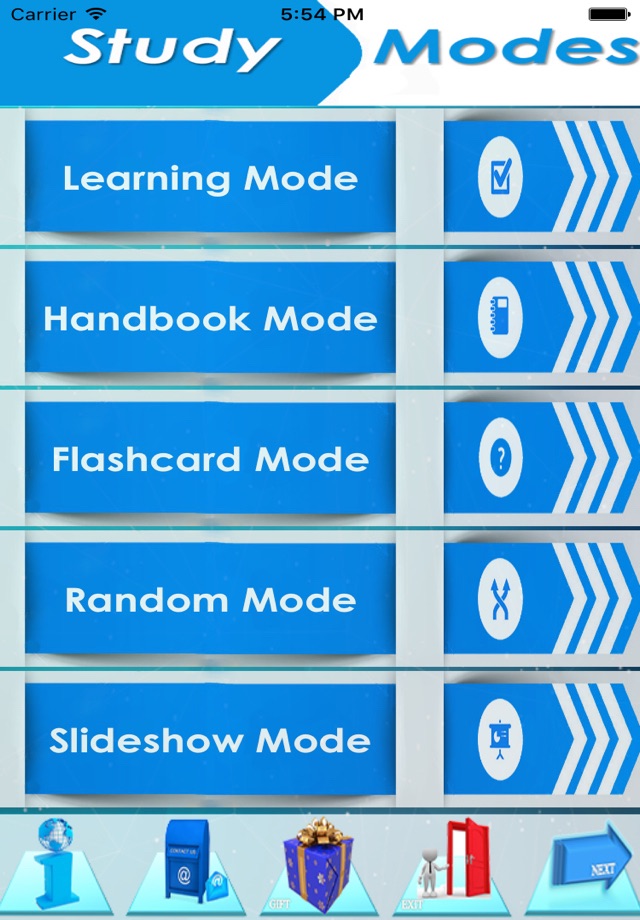
Anxiety Types, Sympt & Therapy app for iPhone and iPad
Developer: Karim SLITI
First release : 19 Jan 2016
App size: 21.09 Mb
Anxiety Types, Symptoms & Medication: 2000 notes & quiz.
This app is a combination of sets, containing practice questions, study notes, terms & concepts for self learning & exam preparation on the topic of Anxiety symptoms, causes & therapy.
Anxiety is an emotion characterized by an unpleasant state of inner turmoil, often accompanied by nervous behavior, such as pacing back and forth, somatic complaints and rumination.
With this app you can learn on the Go, Anytime & Everywhere. The learning & understanding process never been so easy like with our 5 study modes embedded in this app.
Our Learners get the best, thats why they dont just meet standards, They exceed them.
Get +2000 Study notes, exam quizzes, terms & definitions and Prepare & Pass Your Psychology Exam easily to guarantee the highest score.
By the end of this app we expect that you expand your knowledge, widen your expertise, improve your practical skills and Broaden your academic & career horizons.
We promise that this app will strengthen your self-confidence during the exam & daily work.
Remember that you should get the Skills you need to land the job you want.
Learn & educate your self as much as you can, knowledge is the real and best capital & assets that you own.
Invest in your Success Now. Your investment in knowledge, professionalism & expertise is durable & with a High value added. Its a High return investment.
In this application you will get over 20 Exam sets.
This App energized your creativity, showcases your talents and strength your self-confidence during the exam & daily work.
You will get better understanding, less preparation time & a better score in the exam.
-This application is downloaded and used by graduate & undergraduate students, teachers, lecturers, professionals, PhD, researchers, reviewers not only in the US but also in Philippines, Canada, India, Australia, Turkey, Russia, UK, GCC, India, Saudi Arabia, Nigeria, and all over the world.
Main Features:
- +2000 exam questions and study notes
- 5 study modes
- Shareable content
- Settings: with flexibility to change font size & background control.
It is the subjectively unpleasant feelings of dread over anticipated events, such as the feeling of imminent death. Anxiety is not the same as fear, which is a response to a real or perceived immediate threat; whereas anxiety is the expectation of future threat. Anxiety is a feeling of fear, uneasiness, and worry, usually generalized and unfocused as an overreaction to a situation that is only subjectively seen as menacing. It is often accompanied by muscular tension,restlessness, fatigue and problems in concentration. Anxiety can be appropriate, but when experienced regularly the individual may suffer from an anxiety disorder.
People facing anxiety may withdraw from situations which have provoked anxiety in the past. There are various types of anxiety. Existential anxiety can occur when a person faces angst, an existential crisis, or nihilistic feelings. People can also face mathematical anxiety, somatic anxiety, stage fright, or test anxiety. Social anxiety and stranger anxiety are caused when people are apprehensive around strangers or other people in general. Furthermore, anxiety has been linked with physical symptoms such as IBS and can heighten other mental health illnesses such as OCD and panic disorder.
Anxiety can be either a short term "state" or a long term "trait". Whereas trait anxiety is a worry about future events, close to the concept of neuroticism, anxiety disorders are a group of mental disorders characterized by feelings of anxiety and fear,Anxiety disorders are partly genetic but may also be due to drug use, including alcohol, caffeine, and benzodiazepines (which are often prescribed to treat anxiety), as well as withdrawal from drugs of abuse. They often occur with other mental disorders, particularly bipolar disorder, eating disorders, major depressive disorder, or certain personality disorders.



